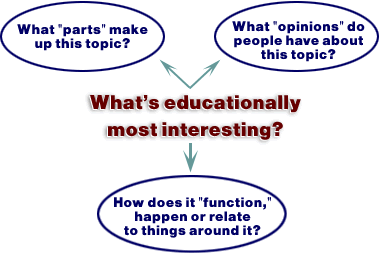Transforming Information into UnderstandingIntroductionThis page is designed to help you prompt students to transform new information they have acquired into new knowledge they can use. This is the basis of any WebQuest, right? In the early stages of designing a WebQuest, you focus on a learning goal that involves critical thinking. This usually takes shape when you identify a main Question and Task for the WebQuest. Often the most apt transformative thinking and task come from a mix of the topic, what you found on the Web, and your students' learning needs. This is the best place to start. If you're new to WebQuests, are stumped as to transformative prompting, or have to get this thing done ASAP, then give one of the following three main approaches a shake. Begin by asking yourself:
Could it be:
Take time to cluster your responses to these questions:  Web-and-Flow has built in some Expertise Scaffolds based upon these three main questions (parts, opinions, and functions). This isn't to say, again, that these are all of the strategies you could use, but they do seem to cover a lot of the strategies that folks tend to turn to when creating WebQuests. So we built them in to give you a boost. You can also use another, more elaborated version of this cluster that shows examples. You might also want some tips on how to choose from among the approaches. When you have a handle on this, use the Table below to see what kind of roles and group synthesis you can prompt based on this approach. For each of the three main approaches / questions, we offer three examples from different curricular areas (science, English, and social studies). The Individual Expertise tasks would be used for the Roles section of a WebQuest. The Group Synthesis gets into even higher order thinking that follows on from the expertise individuals developed while in a role. Spend some time on this table and see if you learn anything you could use with your WebQuest. You might want some tips on choosing a Group Synthesis task for that last crucial part of every WebQuest.
Tips for how to Choose a Transformative ApproachFirst of all, some topics may be more suited to one of the three main approaches (parts, opinions, and functions). For example, studying the elements of cloud types (parts) makes more sense then looking for people's opinions ("I've looked at clouds from both sides now...?"). Similarly, it would be a shame to study ecology / habitats and only look at the elements and people's opinions, not exploring the robust learning involved in understanding the interdependent nature of the environment. So, the first tip is to look to the topic and see if there's a natural fit between it and at least one of the three transformative approaches. A second tip is to look at the approaches as a sort of progression of complexity. It's cognitively easier to analyze the parts of a topic than to understand how people's opinions on it differ. Furthermore, being able to hypothesize causes and effects or predict outcomes through some "if-then" rules is more challenging than arguing an opinion based on synthesizing others'. So think about the ability and experience level of your students. For primary and middle school students, analyzing the elements of a topic is good work. If they can begin to see different viewpoints, that's great. However, if they are high achievers and good problem-solvers, hypothesizing how things inter-relate is terrific. For secondary students, remaining at the "parts" level doesn't seem challenging enough. But you know your students best and that's why you're the one creating this WebQuest. Tips for Choosing a Group Synthesis TaskAs you can see from the table above, each of the three approaches suggests both Individual and Group tasks. If you used only one of the Individual Expertise Scaffolds for all of the roles, then look to the Group Process associated with that approach. For example, if students identified the defining characteristics of the topic, they now have criteria that could be used to evaluate other examples of the topic. If they compared and contrasted opinions, for the group synthesis they can argue persuasively what the best solution or interpretation is. Finally, if they analyzed causes and effects or created if/then statements, they can use these to problem-solve a similar situation set in different circumstances. | ||||||||||||||||||||||||||||||||||||||||||||